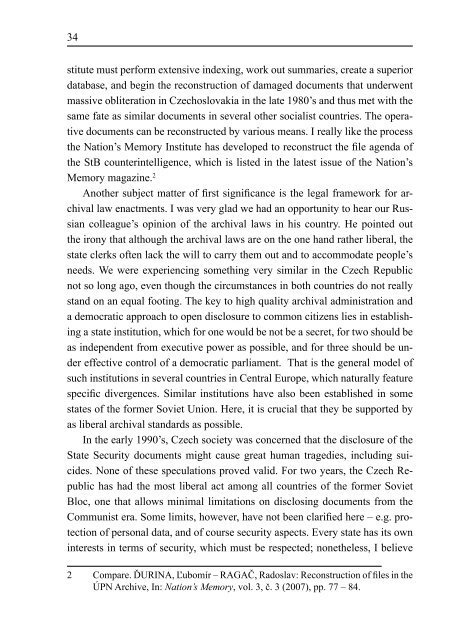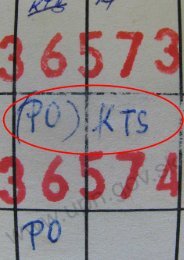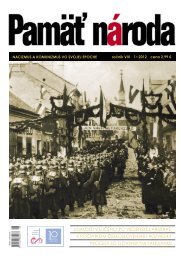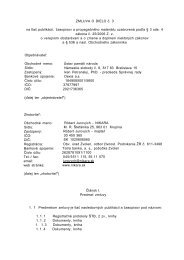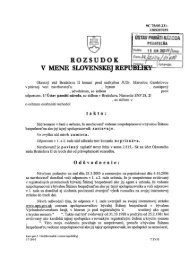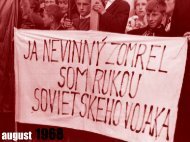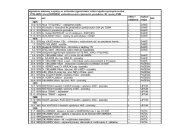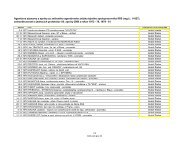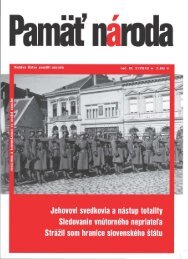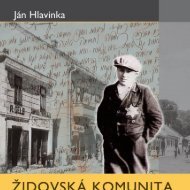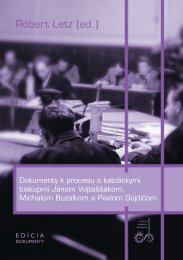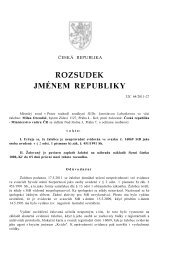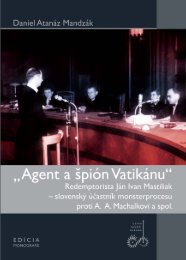- Page 4 and 5: NKVD/KGB Activities and its Coopera
- Page 6 and 7: 5 Contents DECLARATION on a confere
- Page 8: 7 Prokop Tomek (Czechia): SOUD and
- Page 11 and 12: 10 bution to the research and the p
- Page 14 and 15: 13 František Mikloško Vice chair
- Page 16 and 17: 15 Jiří Liška Vice-Chair of the
- Page 18 and 19: 17 Ivan A. Petranský Chair of the
- Page 20: PANEL I SECURITY ARCHIVES AS SOURCE
- Page 23 and 24: 22 Departments of Economy in Triest
- Page 25 and 26: 24 Ladislav Bukovszky Nation’s Me
- Page 27 and 28: 26 ministrative agencies inside the
- Page 29 and 30: 28 and Analysis at the Federal Mini
- Page 31 and 32: 30 Western European militarist forc
- Page 33: 32 Petr Blažek 1 Department of Arc
- Page 37 and 38: 36 Gergö Bendegúz Cseh Historical
- Page 39 and 40: 38 the in stitution each important
- Page 41 and 42: 40 4. Last but not least I would li
- Page 43 and 44: 42 eventually receive the legal qua
- Page 45 and 46: 44 Ralf Blum Federal Commissioner f
- Page 47 and 48: 46 How was the activity of the Sovi
- Page 49 and 50: 48 documents that were concerned wi
- Page 52: PANEL II FROM SOVIET ADVISORS IN S
- Page 55 and 56: 54 Rafaeł Wnuk Institute of Nation
- Page 57 and 58: 56 prime minister, and the Peasants
- Page 59 and 60: 58 system project anticipated that
- Page 61 and 62: 60 The necessity to organize themse
- Page 63 and 64: 62 The formation process of securit
- Page 65 and 66: 64 that the accused was deprived of
- Page 67 and 68: 66 The NKVD units which had their o
- Page 69 and 70: 68 The biggest military success of
- Page 71 and 72: 70 most of them were accused of ‘
- Page 73 and 74: 72 power. It was the liquidation of
- Page 75 and 76: 74 Directorate SNB (cryptology) and
- Page 77 and 78: 76 veillance equipment installed in
- Page 79 and 80: 78 mation on the location of techni
- Page 81 and 82: 80 under the control of the General
- Page 83 and 84: 82 Sector of the Ministry of Armed
- Page 85 and 86:
84 In the meeting of the CC Secreta
- Page 87 and 88:
86 Singapore, Spain, Sweden, Switze
- Page 89 and 90:
88 had earlier taken up connections
- Page 91 and 92:
90 count with Ernő Szücs while he
- Page 93 and 94:
92 advice without being asked and t
- Page 95 and 96:
94 Ferenc Nagy former Prime Ministe
- Page 97 and 98:
96 tion in the future. However, the
- Page 99 and 100:
98 ship between our countries”. 2
- Page 101 and 102:
100 Jan Kalous The Institute of Doc
- Page 103 and 104:
102 job of establishing the new sta
- Page 105 and 106:
104 was serving time, which is iron
- Page 107 and 108:
106 One could get the most comprehe
- Page 109 and 110:
108 anti-Soviet resident in the ČS
- Page 111 and 112:
110 September 1949. He evidently so
- Page 113 and 114:
112 remained separate. According to
- Page 115 and 116:
114 jails, operative technologies c
- Page 117 and 118:
116 How did Plaček later perceive
- Page 119 and 120:
118 Tamborské lesy neznáte Však
- Page 122 and 123:
121 Petr Kopal - Panel moderator In
- Page 124 and 125:
123 briefing, or to deposit any mat
- Page 126 and 127:
125 were „engaged in direct, or i
- Page 128 and 129:
127 the interests of American big m
- Page 130 and 131:
129 acquaintance of his had also be
- Page 132 and 133:
131 a „progressive mass newspaper
- Page 134 and 135:
133 as „remarkably reactionary.
- Page 136 and 137:
135 given a work permit, Hungarian
- Page 138 and 139:
137 information on Canada and the U
- Page 140 and 141:
139 RCMP led authorities at the Int
- Page 142 and 143:
141 Christopher Adam; completed a B
- Page 144 and 145:
143 The Chernobyl accident was the
- Page 146 and 147:
145 In the spring of 1988 KGB took
- Page 148 and 149:
147 Stefano Bottoni University of B
- Page 150 and 151:
149 lic, still multi-confessional a
- Page 152 and 153:
151 by Moscow and its allies, they
- Page 154 and 155:
153 became the best possible ambass
- Page 156 and 157:
155 lists. 16 For the second sessio
- Page 158 and 159:
157 Thanks to „Mozart” and the
- Page 160 and 161:
159 rectors leading it between 1965
- Page 162 and 163:
161 Villot, and religious orders, e
- Page 164 and 165:
163 bring the old Primate to Rome t
- Page 166 and 167:
165 Hungary’s agent network and t
- Page 168 and 169:
167 rian intelligence officers coul
- Page 170 and 171:
169 manian foreign intelligence, wh
- Page 172 and 173:
171 collaborationist clergy, well-i
- Page 174 and 175:
173 himself showed dissatisfaction
- Page 176 and 177:
175 Pope was highly appreciated, an
- Page 178 and 179:
177 Andrzej Grajewski Catholic week
- Page 180 and 181:
179 referred to at that time - acti
- Page 182 and 183:
181 rious reasons by the SB. 9 Ther
- Page 184 and 185:
183 Vatican Council, where he was a
- Page 186 and 187:
185 Preparation by the MSW of the m
- Page 188 and 189:
187 more troublesome partner than t
- Page 190 and 191:
189 perienced and trusted officers,
- Page 192 and 193:
191 Many officers of the MSW were t
- Page 194 and 195:
193 the persecuted Churches. He ask
- Page 196 and 197:
195 The material describes in great
- Page 198 and 199:
197 1. „Kompleks Judasza: Kości
- Page 200 and 201:
199 cratic procedure while in the E
- Page 202 and 203:
201 a few vestiges like this in the
- Page 204 and 205:
203 ania i Statystyki) and the Cath
- Page 206 and 207:
205 because of the huge Polish debt
- Page 208 and 209:
207 It was the reason for which the
- Page 210 and 211:
209 still in June 1989. Of course,
- Page 212 and 213:
211 • West Berlin citizens were n
- Page 214 and 215:
213 understandable that the ministe
- Page 216 and 217:
215 The Soviet identification of th
- Page 218 and 219:
217 no intention to point out the i
- Page 220 and 221:
219 and other individual informatio
- Page 222 and 223:
221 the regime connected with openi
- Page 224 and 225:
223 Peter Rendek Nation´s Memory I
- Page 226 and 227:
225 As for other activities he cond
- Page 228 and 229:
227 the Soviet residency accordingl
- Page 230 and 231:
229 Throughout the case, all essent
- Page 232 and 233:
231 Following a request of the Czec
- Page 234 and 235:
233 RICHARD (the assumed name of Co
- Page 236 and 237:
235 of NATO and the USA to conduct
- Page 238 and 239:
237 agreed that the Soviet party wo
- Page 240 and 241:
239 Moscow Discussions On September
- Page 242 and 243:
241 the Czechoslovak party so desir
- Page 244 and 245:
243 The analysis of the material wa
- Page 246:
PANEL IV NKVD/KGB´S CO-OPERATION
- Page 249 and 250:
248 László Ritter Institute of Hi
- Page 251 and 252:
250 Petr Blažek Department of Arch
- Page 253 and 254:
252 He was also a representative of
- Page 255 and 256:
254 Staffing Jaroslav Krtička, a 7
- Page 257 and 258:
256 Lieut.Col. Josef Koudelný (194
- Page 259 and 260:
258 Lieut.Col. Miloš Holeček (194
- Page 261 and 262:
260 dents chose several potential c
- Page 263 and 264:
262 the CMEA 41 bodies and organiza
- Page 265 and 266:
264 2) In reference to the forewarn
- Page 267 and 268:
266 c) Along the line of protecting
- Page 269 and 270:
268 Responsible person: mjr. BUCHÁ
- Page 271 and 272:
270 Deadline: concurrently Responsi
- Page 273 and 274:
272 D 3 Moscow, 1989, ]October 17 t
- Page 275 and 276:
274 Chief Officer of the 12 th Unit
- Page 277 and 278:
276 The information was offered at
- Page 279 and 280:
278 needs. The KGB controlled organ
- Page 281 and 282:
280 ligence, which was striving to
- Page 283 and 284:
282 that a positive result of a que
- Page 285 and 286:
284 The future might have brought a
- Page 287 and 288:
286 Bernd-Rainer Barth Germany Noel
- Page 289 and 290:
288 The East German secret police h
- Page 291 and 292:
290 part of a joint action carried
- Page 293 and 294:
292 1.) From an internal note made
- Page 295 and 296:
294 not discriminate between the be
- Page 297 and 298:
296 In this decision, the MSS proba
- Page 299 and 300:
298 Georg Herbstritt, Dr., M. A., b
- Page 302 and 303:
301 Roger Engelmann - Panel moderat
- Page 304 and 305:
303 Firstly: The Soviet arrests mad
- Page 306 and 307:
305 With respect to the efforts of
- Page 308 and 309:
307 Corresponding to the arrest tim
- Page 310 and 311:
309 trials were just fake trials pl
- Page 312 and 313:
311 control and made the commissari
- Page 314 and 315:
313 arrests were also ordered accor
- Page 316 and 317:
315 the protection of the very stat
- Page 318 and 319:
317 crematorium and her ashes burie
- Page 320 and 321:
319 death on counts of „high trea
- Page 322 and 323:
321 The first executions by shootin
- Page 324 and 325:
323 years of waiting and gloomy unc
- Page 326 and 327:
325 the Moscow prison of Butyrka, i
- Page 328 and 329:
327 dressed to his wife Hertha by h
- Page 330 and 331:
329 pionage department of the MSS f
- Page 332 and 333:
331 Poliburo of the Presiding Centr
- Page 334 and 335:
333 In response to the list of name
- Page 336 and 337:
335 Dieter Bacher Ludwig Boltzmann
- Page 338 and 339:
337 The Soviet power often consiste
- Page 340 and 341:
339 one worked for NTS, 21 which ve
- Page 342 and 343:
341 later, on April 20, 1951, he wa
- Page 344 and 345:
343 over to the military headquarte
- Page 346 and 347:
345 the KPÖ: Adolf Kothbauer, form
- Page 348 and 349:
347 how Chochlov, under the cover n
- Page 350 and 351:
349 main focus of future researches
- Page 352 and 353:
351 These minor issues should not b
- Page 354 and 355:
353 and 1953. It should come out in
- Page 356 and 357:
355 Razin, 8 and between 1949-52, i
- Page 358 and 359:
357 the number of the Soviet adviso
- Page 360 and 361:
359 These regulations were based on
- Page 362 and 363:
361 oral order to establish German
- Page 364 and 365:
363 to 160 in 1946, to almost 700 t
- Page 366 and 367:
365 which he presented in Moscow, a
- Page 368 and 369:
367 the „Research Institute for E
- Page 370 and 371:
369 as a part of its political prop
- Page 372 and 373:
371 tion after 1933, München/New Y
- Page 374:
373 as : Warsaw (1992, 1994), Mosco
- Page 378 and 379:
377 Miroslav Lehký Institute for t
- Page 380 and 381:
379 a request to map the infiltrati
- Page 382 and 383:
381 Walter Süß * Federal Commissi
- Page 384 and 385:
383 Nikita V. Petrov* Memorial, Mos
- Page 386 and 387:
385 lic. It could be a good method
- Page 388 and 389:
387 Official relationship of the Š
- Page 390 and 391:
389 Methodical assistance of the KG
- Page 392 and 393:
391 Document exhibition: KGB Zvolen
- Page 394 and 395:
393 Operation Explosion Produced by
- Page 396 and 397:
395 Conference Partners Nation‘s
- Page 398 and 399:
397 Office, has been established to
- Page 400 and 401:
399 Institute for the Study of Tota
- Page 402 and 403:
401 Konrad-Adenauer-Stiftung Verbin
- Page 404:
403 rence and the anthology, as wel


